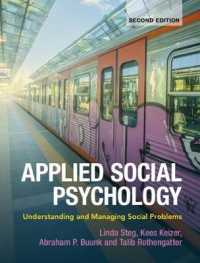基本説明
Complements rather than updates Outcomes Assessment in Higher Education.
Full Description
Revisiting Outcomes Assessment in Higher Education complements rather than updates Hernon and Dugan's 2004 Outcomes Assessment in Higher Education. As with its predecessor, it offers a cross-campus diversity of voices: contributors hail from various segments of higher education, including officers of institutional accreditation organizations, an academic vice president, academic deans, a higher education consultant, faculty members, and librarians. Individually, they shed light on how their corner of the higher education universe views, facilitates, and substantiates outcomes assessment. Together, they document what is known about outcomes assessment in the middle of the first decade of the new century, as institutions and their programs take ever firmer steps from anecdotal evidence to more rigorous diagnosis and reporting.
The current interest in outcomes assessment represents a major shift in recent decades in attitudes about evaluating education. Outcomes assessment deals not only with assessment, but with accountability, usually in terms of accomplishing goals defined as desirable by the institution in question. It questions the results of educational processes, and focuses the argument on what students, faculty, and administrators demonstrably do. Revisiting Outcomes Assessment in Higher Education complements rather than updates Hernon and Dugan's 2004 Outcomes Assessment in Higher Education. As with its predecessor, it offers a cross-campus diversity of voices: contributors hail from various segments of higher education, including officers of institutional accreditation organizations, an academic vice president, academic deans, a higher education consultant, faculty members, and librarians. Individually, they shed light on how their corner of the higher education universe views, facilitates, and substantiates outcomes assessment. Together, they document what is known about outcomes assessment in the middle of the first decade of the new century, as institutions and their programs take ever-firmer steps from anecdotal evidence to more rigorous diagnosis and reporting. For faculty, administrators, and librarians at all academic institutions; accreditation organizations and associations, including program accreditors; program officials in national associations; and other stakeholders, including members of state and other governments wanting to see what academe is doing to link accountability with continuous quality improvement.
Contents
Preface Institutional Mission-centered Student Learning, by Robert E. Dugan and Peter Hernon Accountability and Quality Improvement, by Linda Suskie Stakeholders of Higher Education Institutional Accountability, by Robert E. Dugan The Assessment Matrix: Providing Evidence of a Sustainable Commitment to Student Learning,by Cecilia Lopez Assessment Strategies for Institutional Accountability, by Robert E. Dugan Design and Methodological Considerations, by Peter Hernon Methods of Data Collection, by Peter Hernon Managing Electronic Portfolios, by Candy Schwartz The Learning Organization: Assessment as an Agent of Change, by Patricia M. Dwyer Applying Student Learning Outcomes to an Educational Program, by Peter Hernon and Candy Schwartz An International Perspective on Educational Excellence, by Peter Hernon Standardized Learning Outcomes: Assessing and Recording Achievement in Non-Accredited Adult Education Courses, by Jutta Austin Outcomes Assessment in Canadian Higher Education, by Heidi Julien Information Technology and Outcomes Assessment in Higher Education, by Renee Jefferson Some Techniques for Outcomes Assessment, by Gloriana St. Clair and Carole A. George Collaborating on Information Literacy, by Elizabeth Carter and Renee Jefferson Development of an Information Literacy Assessment Instrument, by Terrence Mech Service Quality: A Perceived Outcome for Libraries, by Martha Kyrillidou Future Directions in Outcomes Assessment, by Peter Hernon and Robert E. Dugan Appendix: Web Resources Bibliography







